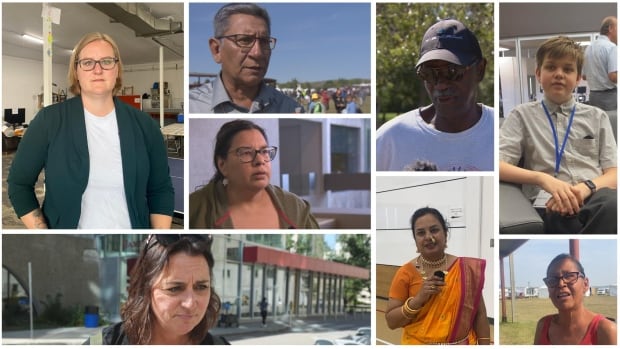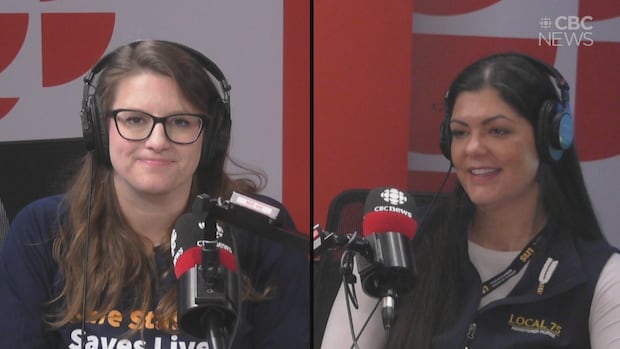I asked more than 50 Sask. residents what matters to them in this election. Here’s what I discovered
What actually matters to Saskatchewan residents in this month’s provincial election? If the 50 regular voters we recently talked with are representative, it’s health care, cost of living and schools.
I’ll admit, talking with random strangers isn’t easy. When I walk up to a stranger on the street, my gut clenches and I have to force a smile. But it’s important, and the insight it gives CBC is valuable.
That’s why I’ve spent the last couple of months asking Saskatchewan people what’s most important to them, both in an online form that solicited more than 150 responses from across the province, and in conversations on the street in towns and cities across southern Saskatchewan. I visited five communities, going into different spaces from a powwow ground to a parental rights meeting.
While some people just shrugged and said they hadn’t been paying attention or didn’t plan to vote in the Oct. 28 election, there were three consistent themes that came up wherever I went.
I got a glimpse into how people are navigating their day-to-day lives and how they hope the next government will help tackle the issues of health care, education and cost of living to make their lives better.
A stretched health-care system
Brenda Andrews, 64, wrote to CBC via our online form, saying she hadn’t been able to see an ophthalmologist for her complex glaucoma. She’d also struggled with walking, and after a few months of not having the issue properly diagnosed or dealt with, she paid for an MRI scan in the U.S. to get to the root of the issue, she said.
“We paid all our working lives into the health-care system. Now it is not there for us,” said Andrews, noting her rural hospital in Kamsack has dealt with a loss of services and beds in the past few years.
“In my opinion, medicare is dead — we just haven’t buried it yet.”
It’s not a problem among just seniors either. I spoke to first-time voter and college student Allister Watson in Estevan, who said with complex health needs, health care was top of mind for him as well.
“My medical appointments are usually long trips halfway across the province that get fairly expensive for gas and food and hotels. And it’s all of that for a 20-minute appointment that could have been done over, like, a video call,” he said, noting this means missing school and seeing his grades suffer.
“It wears on me.”
Shay Millard is currently on maternity leave from her role as a registered nurse in a Regina hospital operating room, but she saw the stresses on the health-care system from the other side.
“We’re the Level 1 trauma centre in the city, and it’s really hard to get coverage and appropriate staffing,” she said.
“You pick up more … [on-call shifts] than is possible for one person and it’s just a lot of overtime and a lot of long shifts, late nights.”
The province has recruited several Filipino health-care workers to come to Saskatchewan — staff she described as “fantastic” — but she believes retention will remain an issue unless conditions are safer, less stretched and less toxic for health-care staff.
“People are leaving because they’re overworked, and it’s not conducive with a family-life balance. So they’re leaving places like the O.R. where we need their expertise, because [there’s] a lot to learn there.”
WATCH | Frustrated nurses describe working conditions on CBC’s Blue Sky:
Two Saskatoon nurses say the health-care system is at a breaking point and that they need to speak out about what they are seeing. Sarah Peters, a veteran ER nurse at Royal University Hospital, and Stephanie Fehr, an ER nurse at St. Paul’s Hospital, talked with Blue Sky host Leisha Grebinski.
At Weyburn’s Culture Days, registered nurse Asha Shivarajan said she’s seen Canadian citizens skipping long wait lines and going back to India to get treatment for illnesses like cancer.
For her, the top election issue is getting people’s qualifications assessed more quickly, to alleviate the stress on the health-care system.
“I got my RN licence just recently in 2024, 10 years after I passed my RN exam from Ontario. But since they had so much trouble with recognizing my RN licence from a different province in the same country, it took me 10 years,” she said.
She hopes to see her friends with nursing backgrounds avoid having to jump through multiple hoops to get their skills assessed.
Finding the money to live
I ran into Kayleigh Pearce from Pense while out at the Lumsden Duck Derby in August. When I asked her husband what his top issue was, Pearce was quick to jump in and list off their family’s rising power and grocery bills.
“With trying to feed five kids — they’re growing [and] we want them to be healthy and happy. But if it’s going to be the difference between a car payment and feeding my kids, no family should have to go through that,” she said.
WATCH | Sask. mother of 5 says cost of living is her top election issue:
Kayleigh Pearce, a mother of five from Pense, describes the cost-of-living challenges middle-class families are facing in Saskatchewan. In the lead-up to the provincial election, she’s watching for which political party lays out a plan to make life more affordable.
She and her husband both have decent-paying jobs, but Pearce said she wasn’t sure how others who weren’t so fortunate could make ends meet.
“It’s ridiculous,” she said. “Right now, as parents, we’re planning to hopefully be able to afford a big enough house so our kids can live with us until they’re 25 if they need to, and that sucks.”
I noticed that Pearce wasn’t alone in thinking of the future, particularly when it came to the cost of living and housing. If things are bad now, what might they be like for future generations?
Deborah Cookson said she may have a home herself, but she has young grandchildren who are struggling with what she called “outrageous” rents.
“By the time you pay that, you pay your food, you pay your gas and you pay your bills, whatever else, they can’t ever … save any to put the down payment down,” she said, as she stopped along her walk at the legislative grounds in Regina.
“I don’t want them to have to suffer the rest of their lives and not be able to get a nice house someday.”

Just being able to find a rental can be a challenge for many. Regina’s Miranda Hanus said that when her old home flooded, she struggled to find a place that didn’t have pests, was in a decent neighbourhood and would be affordable.
“At one point I was actually looking into that option, sleeping in my car, if worse came to worse,” she said.
Hanus was able to find a place that cost her $800 a month, but said others are not so lucky, and she can see how easy it would be to slide into homelessness.
Education concerns
I was surprised by how many times people listed “education” as their major election issue, including those who weren’t teachers or parents of school-age kids. That was the case for a couple of university students I caught up with during the University of Regina’s move-in day.

“I’m passionate about students and teaching, but I worry about the younger generation, the new teachers that are coming into the profession,” said Arlene Low, a school principal from Davidson who was helping her child move into the university for the first time.
“I feel like there’s so much pressure on them and they don’t have the supports that they need.”
Estevan Public Youth Centre executive director Merissa Scarlett said she could see the impacts of COVID-19 and interruptions on learning every day in her job. Some kids she sees struggle to write their own name, she said.
“From my job, I see 11- to 17-year-olds who have a hard time reading and writing — and if you can’t read or write, you’re going to have a hard life,” she said, noting those missing skills could have a knock-on effect in other areas of a young person’s life, from their mental health to finding a job.

The year-long contract dispute between teachers and the government appeared to leave a bitter taste in voters’ mouths, particularly for those who are educators or who identified themselves as relatives of educators.
Is any one issue enough to sway change?
While health care, education and affordability repeatedly came up as crucial topics, most voters didn’t seem to have a clear answer on which party was best placed to address these issues.
First Nations voters I spoke to at a Treaty 4 celebration in Fort Qu’Appelle expressed a real sense of disconnect with politicians, who were seen by and large as not honouring treaties and doing little more than paying lip service to things like truth and reconciliation.
“The government has to take some responsibility for their actions and move forward,” said Nadine Goodwill from Standing Buffalo Dakota Nation. She said she hoped to see more action from politicians on sharing land and resources equally with First Nations people, as promised in those treaties.
Governments need to sit down and talk with First Nations people to address key issues like climate change, according to Pasqua First Nation Chief Matthew Todd Peigan.

“Sadly, our mindset has strayed to more materialistic and greed, rather than working together, living as one people, and looking after Mother Earth,” he said.
For all the time and energy politicians have spent arguing against the carbon tax, not one person I spoke to on the streets raised the carbon tax as a top election issue. Only a few rated the climate as their top election issue, even after another hot and smoky summer, and more temperature records being broken across Saskatchewan.
After 17 years of unbroken Saskatchewan Party electoral success, the big question is whether any other party can make a dent in its support base.
One farmer in Weyburn put that exact question back to me. As someone with two children, both of whom have special needs, his number 1 issue was education and ensuring his children’s needs would be met.
However, he noted, Weyburn has been represented by the Sask. Party since 2006, and for him personally, no one issue was going to change how he voted. He wondered out loud — is any given issue likely to sway voters to opt for change in this year’s election?
As always, that’s up to voters when they mark their ballots on Oct. 28.




